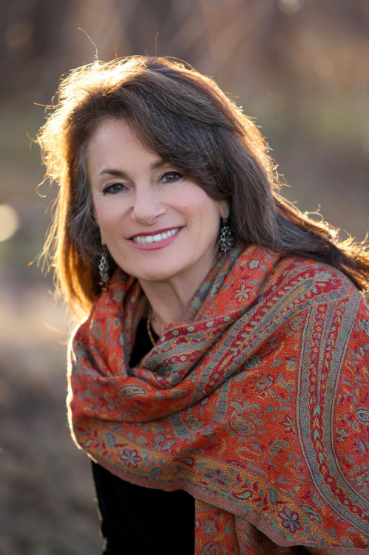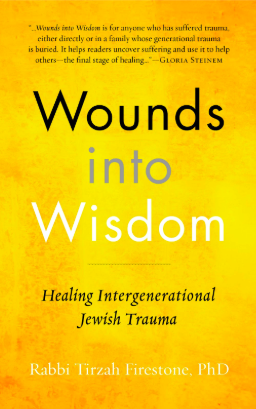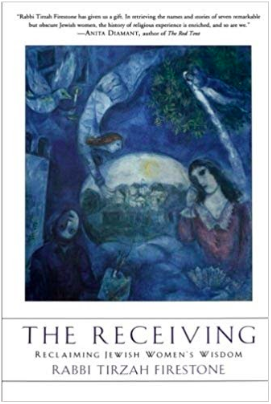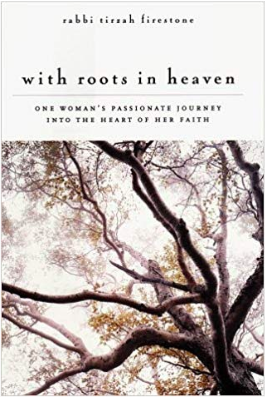Tirzah Firestone answers the question:
What is the nicest thing a non-family member has ever done for you?
 Such a great question. So many kindnesses come to mind when I think of that, but I'd like to zero in on one that absolutely changed my life. It was something that happened to me when I was roughly 18, 19. I was traveling around the world and very footloose and a kind of cocky American kid. I find myself in Israel. I find myself in Jerusalem. I heard about this woman who is something special, but I don't know exactly what, and I find myself on her doorstep. She's a woman from Yemen, the wife of a famous rabbi. Her name is Leah, Leah Sharabi.
Such a great question. So many kindnesses come to mind when I think of that, but I'd like to zero in on one that absolutely changed my life. It was something that happened to me when I was roughly 18, 19. I was traveling around the world and very footloose and a kind of cocky American kid. I find myself in Israel. I find myself in Jerusalem. I heard about this woman who is something special, but I don't know exactly what, and I find myself on her doorstep. She's a woman from Yemen, the wife of a famous rabbi. Her name is Leah, Leah Sharabi.
She opens the door and she asks me to come in. Somehow, Leah saw through my exterior, my cocky, entitled, suburban American exterior. She asked me if I would like to come with her to work, and I say sure because I hear that this woman is really hot stuff. The next day, I followed her into the deepest slums of Jerusalem. This was in the 1970s and social services had not reached all the crevices of Jerusalem. There was a huge influx of poor immigrants, especially from Tunisia and Iraq and Yemen and Iran and the northern African Middle East, and Jews of color.
I follow Leah down the alleyways and into these hovels of these refugees who are living on nothing, and watched her as she goes into high gear feeding people, lifting people, taking babies, scrubbing floors down on her hands and knees, this very religious woman. Giving out money, giving out food, helping people, giving blessings. It was like entering this whole world, all the while, I learned later, without any pay — like a one-woman show, no prestige, no publicity. She was just doing it because it needed to be done.
I remember watching her in total awe and seeing things that I didn't know existed as a fairly entitled kid, and so I followed her again. Day after day, I followed her and became her apprentice and learned how to scrub floors and learned how to work with dying people and pick up babies and diaper babies and feed people that couldn't feed themselves. Anyway, for several months, I lived with her or lived near her and then worked with her daily. I saw things I had really no preparation for and they changed me.
I am much older now. I think back vividly to this kindness that she... I guess I would say that the niceness, the kindness that she extended to me was taking me on, believing in me, and seeing through my tough teen self. And then, I guess the other side of that coin is that as we walked through the alleyways and streets into these terrible districts, she taught me all kinds of fantastic teachings, things that I didn't know about because after all, I realized later she was married to this famous Kabbalist.
She herself was a mystic, but a hands-on woman who was doing Kabbalah in the trenches, not just talking about it and not just studying it out of a book. She really imparted to me... I think she imparted to me how women do mysticism, how women live the spiritual path, how women embody divinity. She taught me all kinds of things, about reincarnation and the soul's journey, and many, many things. And really, I guess above all, she taught me about kindness.
I guess there's one more thing to say, Phil, and that is that one of her teachings to me was about the chain of souls in this world, and also the chain of receiving and giving. She didn't use the words "paying it forward," but she definitely taught me about, well, you're receiving this now. you're receiving these teachings, and it's understood you're going to be passing them on to others. I extend to you and you extend to others. I've tried in my own way to do that all through my life.
 Rabbi Tirzah Firestone, PhD, is an author, Jungian psychotherapist, and founding rabbi of Congregation Nevei Kodesh in Boulder, Colorado. Ordained by Rabbi Zalman Schachter Shalomi in 1992, she is a leader in the international Jewish Renewal Movement and a renowned Jewish scholar and teacher.
Rabbi Tirzah Firestone, PhD, is an author, Jungian psychotherapist, and founding rabbi of Congregation Nevei Kodesh in Boulder, Colorado. Ordained by Rabbi Zalman Schachter Shalomi in 1992, she is a leader in the international Jewish Renewal Movement and a renowned Jewish scholar and teacher.
Raised in an Orthodox home in St. Louis, Missouri, Tirzah’s spiritual curiosity called her to search beyond the confines of her family’s strict Jewish upbringing. She left home to embark upon a life-changing spiritual odyssey, chronicled in With Roots In Heaven: One Woman’s Passionate Journey into the Heart of Her Faith.
After immersing herself in a wide variety of spiritual practices and worldviews, Tirzah returned with fresh vigor to Jewish studies and became a rabbi in a pluralistic and egalitarian Judaism. Her studies in the feminine wisdom tradition and Jewish mysticism yielded The Receiving: Reclaiming Jewish Women’s Wisdom. Her passion to share an inclusive and joyous Judaism led her to serve as a leader in the international movement for Jewish Renewal and on the board of Aleph: Alliance for Jewish Renewal. Tirzah’s passion for human rights and for the prophetic vision of Judaism led her to Rabbis for Human Rights, North America, now known as T’ruah: The Rabbinic Call for Human Rights.
 Tirzah earned a masters degree in counseling at Beacon College in Boston in 1982, and a doctorate in depth psychology at Pacifica Graduate Institute in Santa Barbara in 2015. Her leading-edge research on the impact and healing of collective trauma draws on the fields of neuroscience, psychology, Jewish literature, and mythopoesis. Her groundbreaking work, Wounds Into Wisdom: Healing Intergenerational Trauma, employs interviews, case studies, and her own autobiographical narratives to demonstrate how trauma residue passes from generation to generation and how it can be transformed.
Tirzah earned a masters degree in counseling at Beacon College in Boston in 1982, and a doctorate in depth psychology at Pacifica Graduate Institute in Santa Barbara in 2015. Her leading-edge research on the impact and healing of collective trauma draws on the fields of neuroscience, psychology, Jewish literature, and mythopoesis. Her groundbreaking work, Wounds Into Wisdom: Healing Intergenerational Trauma, employs interviews, case studies, and her own autobiographical narratives to demonstrate how trauma residue passes from generation to generation and how it can be transformed.
 Now Rabbi Emerita of her congregation, Tirzah maintains a private practice in depth psychology, and teaches nationally about modern applications of ancient wisdom and ancestral healing: how to transform patterns of suffering from our past and bring forth clarity, wisdom, and blessings for ourselves and those who come after us.
Now Rabbi Emerita of her congregation, Tirzah maintains a private practice in depth psychology, and teaches nationally about modern applications of ancient wisdom and ancestral healing: how to transform patterns of suffering from our past and bring forth clarity, wisdom, and blessings for ourselves and those who come after us.
In 2019, upon the release of Wounds Into Wisdom, Tirzah embarked upon a national book tour, facilitating workshops on intergenerational trauma healing from Philadelphia to Berkeley. Use this email address to schedule Rabbi Firestone’s visit to your community.
Tirzah lives in Colorado with her husband David. Together they have three grown children, Brianna, Emily, and Dakota.
Click here to visit Tirzah’s website.
Connect with Rabbi Firestone on Facebook, Instagram, and Twitter.
Catalyst is produced by The Shift Network to feature inspiring stories and provide information to help shift consciousness and take practical action. To receive Catalyst twice a month, sign up here.
This article appears in: 2020 Catalyst, Issue 3: Ancestral Healing Summit



